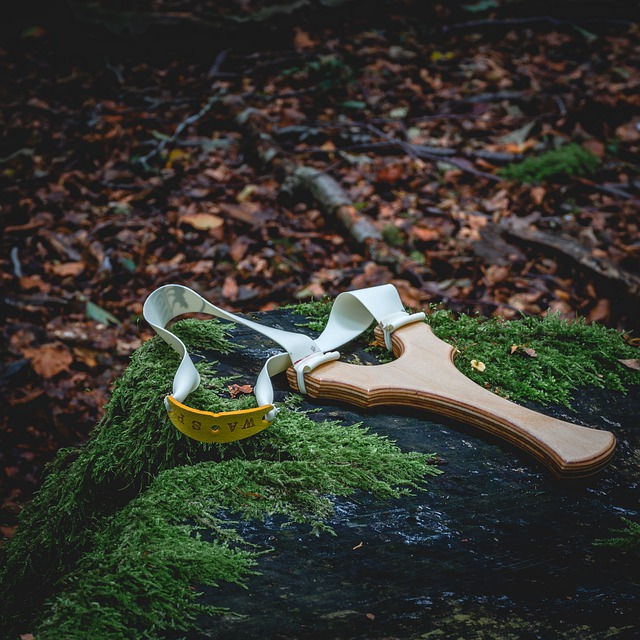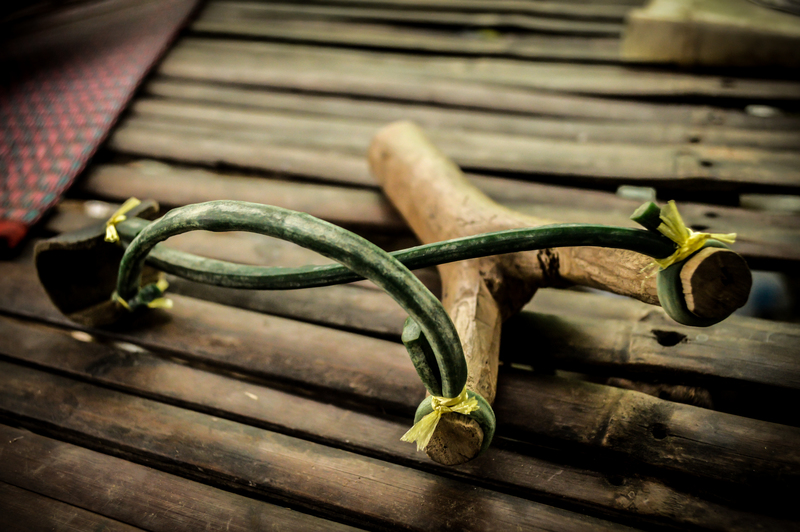To know how to choose a slingshot, first, we need to enlarge our understanding of the tool. A tool that existed a long time before our era.
During the time of our ancestors, people had no guns around. They used slingshots and knives to roam the plains to protect themselves and hunt. A slingshot may seem like a primitive tool, and it is.
However, it was a slingshot that allowed David to win his fight against Goliath, so let that sink in.
Most of us remember the slingshots from our youth. However, many of those who grew up in the 80s or 90s are now parents.
Nowadays, a slingshot no longer looks like the same toy of the past. Wooden frames and rudimentary elastic catapults have disappeared.
An 8 year old novice shooter will have very different requirements than a 30 year old professional hunter. Even with a slingshot.
Be responsible when using your slingshot. Do not use it to kill birds. If you give it to your child as a gift, be sure to teach him or her how to use the weapon properly and responsibly.
You will not need a license to use a hunting slingshot, but that doesn’t mean you don’t need the training to use it safely. This weapon can cause serious injuries to untrained hands.
How to choose your slingshot ammo?

Depending on the model you purchase and your hunting needs, you can choose from a variety of ammunition.
Steel Projectiles
These are metal balls with a diameter ranging from 0.68 mm to 0.44 mm. These balls are dangerous and cause the most damage on impact.
They have the best stopping power, and if you are trying to make animals fall, these balls should be in your hunting kit.
Glass projectiles
Glass projectiles are like rubber-coated beads. They bounce more than steel, so be careful when using them around the house.
Copper projectiles
Some professional hunters like to use copper bullets in their slingshots. These bullets are more expensive than the steel and glass versions.
However, they tend to deform on impact, which requires a professional touch to fire them accurately.
Tungsten carbide projectiles
Hardened projectiles that are lighter than steel balls but have the same strength. However, these projectiles are expensive and it’s better to use steel balls instead.
Do-it-yourself projectiles
You can use almost any projectile you can think of in your slingshot, from hex nuts to pebbles, plastic, or even wood. However, be sure to choose DIY ammunition that doesn’t wear out the rear-firing block of your slingshot.
Are slingshots dangerous?

Yes, slingshots are dangerous weapons. Modern slingshots can seriously injure people if you decide to shoot them.
Just because we all remember slingshots in movies where children used them to shoot and irritate others doesn’t mean that they are not dangerous today.
That’s why slingshots are a less-lethal option for home defense. If you shoot at close range at a person with a steel ball, say within 3 meters, the power of the slingshot can cause skin penetration.
If you catch it in the face, it could cause a fatal injury. A slingshot wound can leave a permanent scare, and in some cases can be fatal.
It’s important to remember that just because your slingshot is a less-lethal weapon, it doesn’t mean you can’t go to jail if you hurt someone. Only use these weapons for hunting, competition, or self-defense.
Do I need to replace parts on my slingshot?
Over time, you may find that some parts of your slingshot start to deteriorate and need to be replaced. The first parts that need to be replaced are the back pad and the sling’s rubbers.
The rubber bands will eventually deteriorate over time. The rubber perishes, so even if you never use the slingshot, the sling rubber will eventually degrade and break when you decide to pull it.
The headgear usually lasts about 1,000 strokes before it’s replaced. Depending on the quality, it may last longer or have a shorter lifespan.
Most slingshots only require a replacement of the rubber bands, and possibly the rubber handle.
However, most models require little maintenance and many are equipped with a replacement harness for extended use before you need to purchase the replacement parts.
What is the effective range of a slingshot?
The effective range of your slings depends on a few factors.
Your age and strength
Although hunting slingshots are easy to use, they often come with strong rubber bands. Young children may not have the strength to pull the rubber band to the fully extended position. As a result, their shots will be softer than those of an adult.
Technique
Your slingshot experience also plays an important role in the range and accuracy of your shots. Professional hunters and sling shooters can hit targets up to 400 feet away using a professional slingshot.
However, the majority of users will have the best effective range between 4 and 7 meters, depending on the ammunition.
The closer you are to your target, the better the accuracy and power of your shots. For larger targets, you will need to get closer for an effective shooting.
Some models of professional hunting slingshots allow you to use real arrows instead of cartridges. This may be a good solution to reduce the pain of the prey when hunting.
What does FPS mean?
The FPS, or feet per second, is a unit of measurement that tells you the speed of the projectile and the force it exerts on the impact.
The stronger the elastic band of your sling, the higher the performance and the faster the FPS. The near-lethal capacity is around 300 FPS, which is much lower than what a slingshot can do.
However, some paintball markers manage to reach values above 300 SPF.
Is a slingshot a good survival weapon?
Yes, the slingshot is an excellent survival tool for hunting small animals such as birds and rabbits. Slingshots are also useful in defense scenarios. Just choose the right slingshot that suits you.
Their small size and light weight make them a perfect fit for your Bug Out Bag. The fact that almost any small and solid object can be used as ammunition makes them highly useful in an SHTF situation.






